A different kind of CV
1948–1967 | Childhood and youth
»And then this music – it just blew me away!
I’ve never heard anything so refined and dramatic before.«
1948 January, born in in Gänserndorf. Already in kindergarten and preschool age I loved to draw, paint and above all to sing. This prompted my parents to ask me to play some of the then current hit tunes when meeting friends and acquaintances. Which I did willingly and received praise for it.
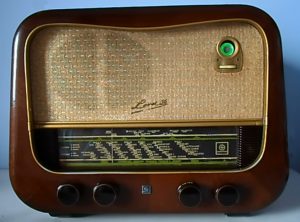 1952 W.A. Mozart. My first formative experience. Most families at that time owned a radio. Usually one of the brands Hornyphon or Philips, which was taboo for children and usually sat on a shelf out of their reach. In our family it was switched on daily only at 6 or 7 pm for 15 minutes when my father wanted to listen to the news. Occasionally, my mother turned it up for an hour or an hour and a half in the afternoon and listened to some programs intended for women on Radio Niederösterreich. These were voice programs with topics typical for housewives, loosened up with rather banal pop songs and operetta melodies.
1952 W.A. Mozart. My first formative experience. Most families at that time owned a radio. Usually one of the brands Hornyphon or Philips, which was taboo for children and usually sat on a shelf out of their reach. In our family it was switched on daily only at 6 or 7 pm for 15 minutes when my father wanted to listen to the news. Occasionally, my mother turned it up for an hour or an hour and a half in the afternoon and listened to some programs intended for women on Radio Niederösterreich. These were voice programs with topics typical for housewives, loosened up with rather banal pop songs and operetta melodies.
One day there was an exception to the – to my sorrow – always strictly observed bedtime at 7 p.m., because on the radio you could hear Mozart’s “Magic Flute”, it would be an opera and if I wanted to, I could stay up longer and listen to it (it was a recording of the Salzburg Festival). I did not know what an opera was. Already the beginning of the program with the festival fanfare and the enumeration of the many international affiliated radio stations impressed me. And then this music – it just blew me away! I have never heard anything so refined and dramatic. I was totally fascinated. The first 1 ½ hours flew by and then my parents said there would be a long break and the second part would be just like the first part and it would be too late for me, so it was time to go to sleep. Even the most massive protest was useless and I went to bed sad and upset. Over the next few days I kept asking when another opera would be broadcast on the radio, but there was (allegedly) no further opera broadcast for the next six months. I couldn’t get this kind of music out of my head.
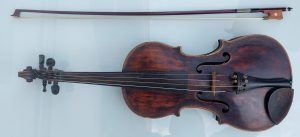 1953 The violin. My grandfather bought me a used violin and I was allowed to go to the local music teacher for violin lessons twice a week. After the usual scratching in the first 2 weeks, however, things progressed briskly, so that my teacher was able to carry through his pedagogical concept. It consisted mainly of etudes to improve finger dexterity and bowing, i.e. the technique. As a reward, I received one each of the “French violin duets” as homework. These were composed in such a way that the 1st violin part was attractive but very easy to play. The 2nd violin part intended for the teacher was accordingly more demanding. I liked them so much that I soon prepared a second duet for the next lesson. However, as time went on, this was at the expense of the more boring technical etudes. Despite admonitions and discreet protests from the teacher, the duets gained more and more the upper hand. After about 2 years he gave up and we played mostly only duets.
1953 The violin. My grandfather bought me a used violin and I was allowed to go to the local music teacher for violin lessons twice a week. After the usual scratching in the first 2 weeks, however, things progressed briskly, so that my teacher was able to carry through his pedagogical concept. It consisted mainly of etudes to improve finger dexterity and bowing, i.e. the technique. As a reward, I received one each of the “French violin duets” as homework. These were composed in such a way that the 1st violin part was attractive but very easy to play. The 2nd violin part intended for the teacher was accordingly more demanding. I liked them so much that I soon prepared a second duet for the next lesson. However, as time went on, this was at the expense of the more boring technical etudes. Despite admonitions and discreet protests from the teacher, the duets gained more and more the upper hand. After about 2 years he gave up and we played mostly only duets.
1957 The Vienna Boys Choir. I was 1 year before the change from elementary school to grammar school. My parents learned by chance that the Vienna Boys’ Choir operated a grammar school of their own within their boarding school, and that there were a certain number of free places. I was asked if I wanted that. I wasn’t sure, but found it quite challenging and intriguing. So they registered me for the entrance examination, which took place in the Imperial Palace in Vienna. Because I had only been to Vienna once before – there were only 2 trains per day with coal-powered steam locomotives – the journey itself was an adventure for me.
The order of the exam candidates was alphabetical, so I was the penultimate candidate on the last day due to my family name. The exam consisted of a theoretical and a practical part (accuracy in interval singing, intonation, rhythm, etc.). I was amazed how easy the tasks were and according to the examiners I passed with flying colors.
When my parents asked for a free place in the boarding school, it turned out that all of them were already taken, because with more than 80 registrations it was not assumed that there were still potential choirboys among the last two. The chairman of the commission phoned around for an hour to find a feasible solution. Accommodation with private families failed because of the costs and daily commuting was completely impossible for time and schedule reasons. The suggestion that I should apply again next year and that they would reserve a free place for me was in vain, since the decision had to be made long before where I would attend high school. So I went back home with strengthened self-confidence but with the certainty that the dream of becoming a member of the “Viennese Boys Quire” is over.
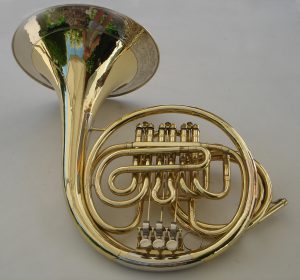 1958 The horn. Coincidences determined the direction of my life in several cases. When, for example, the Gänserndorfer Blasmusikverein (brass band) surprisingly received an invitation to the 1958 World Wind Music Competition in Kerkrade (Netherlands), they were seriously concerned about their international competitiveness. In order to somehow stand out from the mass of presumably excellent military brass bands, the curious idea was born to integrate as many children as possible. In the fund of the music band there were a lot of wind instruments. And so, half a year before the competition, all children from Gänserndorf and the surrounding area were invited to choose an instrument with the promise of a custom-made uniform (uniforms were still something important at that time), free lessons and a trip to the Netherlands.
1958 The horn. Coincidences determined the direction of my life in several cases. When, for example, the Gänserndorfer Blasmusikverein (brass band) surprisingly received an invitation to the 1958 World Wind Music Competition in Kerkrade (Netherlands), they were seriously concerned about their international competitiveness. In order to somehow stand out from the mass of presumably excellent military brass bands, the curious idea was born to integrate as many children as possible. In the fund of the music band there were a lot of wind instruments. And so, half a year before the competition, all children from Gänserndorf and the surrounding area were invited to choose an instrument with the promise of a custom-made uniform (uniforms were still something important at that time), free lessons and a trip to the Netherlands.
My music teacher therefore led me into an adjoining room of his classroom, which was full of musical instruments. I had no preference within the musical instruments I already knew, but one strange thing immediately caught my eye: an instrument with an incredible number of intertwined golden tubes (the gold was freshly polished brass). I wanted to have that, My teacher said it was a “Vienna Horn”. So I took additional horn lessons with him – with moderate success, by the way. The Gänserndorfer Musikverein even won a silver medal in the competition, The demands on me were minimal, thank God, because the horn plays only a minor and negligible role in marching music. For marching music it is enough if you have 4-5 tones on it… The following years I remained with the band, musically it was not very productive.
1960 The Electrical Engineering. In that year, the now grown-up son of the local electrical retailer thought it was time to do something for the youth. In accordance with the technology euphoria prevailing at the time, this was a handicraft course lasting several weeks, during which children made a fully functional radio. The material (a few resistors and capacitors, a voice coil and a speaker capsule removed from the telephone receivers commonly used at the time) was simple and cost only 35 shillings (a little over 2 €). The parts we had to wire, partly solder and mount them on a wooden board.
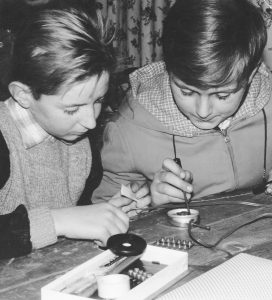 Besides we learned the function of the individual parts and the basics of electrical engineering and how a radio receiver works. The idea behind the construction of the receiver was quite ingenious: The device had to be connected to the power supply system, but the power consumption was so low that it was not detectable by the electricity meter, because the grid primarily served as a receiving antenna.
Besides we learned the function of the individual parts and the basics of electrical engineering and how a radio receiver works. The idea behind the construction of the receiver was quite ingenious: The device had to be connected to the power supply system, but the power consumption was so low that it was not detectable by the electricity meter, because the grid primarily served as a receiving antenna.
The course had two consequences for me: Firstly, I went to bed without resistance from now on and usually listened to music from some foreign radio stations half the night. This is how I discovered, for example, the “High Mass” by J.S. Bach and the symphonies of Anton Bruckner. Of course without knowing what these works were and who composed them, because AM-Receiver at that time had its pitfalls: The transmitters drift off for several reasons, you have to readjust them again and again, and the “signal-to-noise ratio” was so low that the Bruckner’s symphonies sounded very mysterious to me, because the typical massive orchestral outbursts were easy to hear, but the equally typical pianissimo passages, on the other hand, were drowned in noise and were simply not audible. At first I thought the piece was over, but suddenly it was there again.
During the day I was busy trying to figure out what I heard at night. A program guide of the ORF (Austrian Broadcasting Corporation) printed on cheap paper was a great help in this task. Its content consisted exclusively of the detailed programs of all European AM radio stations and the short wave stations worldwide.
The second consequence of the course was an increased interest in electrical engineering and the functioning of audio equipment, for example tape recorders. I built a total of three more radios of this kind for various uncles and aunts.
1961 The first “real” concert. The “Theater der Jugend” (Theater of the Youth), which was reactivated after the second world war, offered schools greatly discounted tickets for the concert cycle “The Great Symphony” at the Vienna Musikverein. This was a great thing, I immediately signed up for it and remained a loyal subscriber until my high school graduation, never missing a single concert. Not only the music fascinated me, but also the atmosphere of the Golden Hall and the festively dressed audience. The whole “surrounding” gave me the impression of being immersed for a few hours in another world, which seemed more desirable with every concert I attended. I tried to imagine what the life of the musicians sitting on the podium looked like, what they did after the concert, what their daily routine might be, and so on.
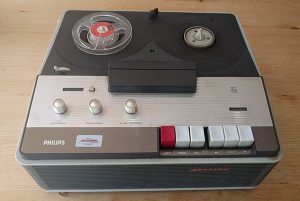 1964 My first tape recorder. There was a gas station 50 meters away from my parents’ house, which was run by the owner and a full-time gas station attendant (at that time there was no self-service). To supplement my pocket money I sometimes (mostly Sundays) helped out some hours. This was an easy and pleasant activity and soon it expanded to a full-time helper. In 1964 I worked as a gas station attendant for a whole month during the summer vacations. With this and the money I had saved I was able to buy the latest Philips tape recorder for 3,200 shillings. At last I could “record” music and listen to it as often as I wanted. It was a dream come true.
1964 My first tape recorder. There was a gas station 50 meters away from my parents’ house, which was run by the owner and a full-time gas station attendant (at that time there was no self-service). To supplement my pocket money I sometimes (mostly Sundays) helped out some hours. This was an easy and pleasant activity and soon it expanded to a full-time helper. In 1964 I worked as a gas station attendant for a whole month during the summer vacations. With this and the money I had saved I was able to buy the latest Philips tape recorder for 3,200 shillings. At last I could “record” music and listen to it as often as I wanted. It was a dream come true.
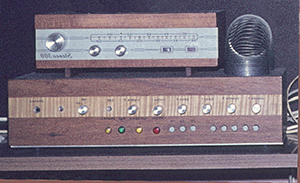 1965 My first self-made stereo system. The local electrical dealer already had the right “nose” in 1960, because a few years later a considerable market for hobby electricians had developed from Germany. You could now buy the components, the corresponding circuit diagrams and breadboards (predecessors of our current printed circuit boards) and build the latest FM stereo radio receivers and stereo amplifiers yourself. So I took the opportunity and put in extra work shifts at the gas station to earn enough money for receiver and amplifier construction kits. An uncle, who was a cabinet maker, built me great walnut-veneered wooden chassis for both units. This way, after I had quickly assembled some loudspeaker boxes, I was able to record and listen to music in my own room with my own stereo system!
1965 My first self-made stereo system. The local electrical dealer already had the right “nose” in 1960, because a few years later a considerable market for hobby electricians had developed from Germany. You could now buy the components, the corresponding circuit diagrams and breadboards (predecessors of our current printed circuit boards) and build the latest FM stereo radio receivers and stereo amplifiers yourself. So I took the opportunity and put in extra work shifts at the gas station to earn enough money for receiver and amplifier construction kits. An uncle, who was a cabinet maker, built me great walnut-veneered wooden chassis for both units. This way, after I had quickly assembled some loudspeaker boxes, I was able to record and listen to music in my own room with my own stereo system!
1966 Consequential decision and coincidence. The high school graduation was just around the corner, which caused me less worry than the draft order of the army, which reached me already in January. I had nothing to do with military drill, on the contrary, I hated this kind of male society. Even in kindergarten I preferred to play with girls than with boys and I generally feel more comfortable with women than with men. Unfortunately, at that time the Minister of Defense was Georg Prader, a conservative hardliner of the ÖVP, who even managed to get members of the Vienna Philharmonic Orchestra who had an exemption and were exempt from military service, to do military service shortly before they were 35 years old. The civil service did not exist at that time, so what to do? The only way out of the dilemma was to apply to the positioning committee for the music corps (Gardemusik). In this case, one had only 6 weeks of basic military training, the rest consisted of rehearsals, secondments and concerts. However, instead of 9 months, one had to commit oneself for one year and pass an audition to be accepted.
So I took out my horn again, which I played once a week at the rehearsals of the brass band, but otherwise I didn’t pay much attention to it and took some lessons with my music teacher. Thank God the bar was not set very high during the audition, because horn players were needed urgently for the Gardemusik. With a scale over 1 ½ octaves and a small, easy solo piece I passed the entrance examination.
1966/67 The Music Academy and the next coincidence. So on July 1, 1966 I moved into the Maria Theresia barracks in Vienna. I unconsciously shortened the six weeks of basic military training to three weeks, because I got pneumonia, spent three weeks in the army hospital, and was then immediately transferred to the Music Corps. The daily prescribed practice time and the rehearsal work had an extremely positive effect on my horn playing. Things went uphill.
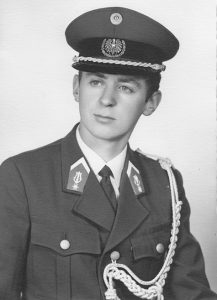 By chance I learned that if you study at the Vienna Academy of Music and Performing Arts, you get half a day “out” twice a week to attend the classes. Wow, that would be a good way to escape the dreary barracks routine! I immediately registered for the last possible entrance examination date in mid-October (so that I would have even more time to practice) and from then on I practiced almost as much every day as I did the whole week before. The entrance exam was still a shaky one. After the audition the jury told me that they expected the candidates to have a much higher technical level than mine…
By chance I learned that if you study at the Vienna Academy of Music and Performing Arts, you get half a day “out” twice a week to attend the classes. Wow, that would be a good way to escape the dreary barracks routine! I immediately registered for the last possible entrance examination date in mid-October (so that I would have even more time to practice) and from then on I practiced almost as much every day as I did the whole week before. The entrance exam was still a shaky one. After the audition the jury told me that they expected the candidates to have a much higher technical level than mine…
However, one of the two horn professors, Friedrich Gabler, principal hornist at the Vienna Volksoper and permanent guest with the Vienna Philharmonic as 1st hornist, said that despite the unsatisfactory level of playing technique, I had shown remarkable musicality. Since a student who had already been formally accepted could not take up his studies for various reasons, he would have a place at his class again since last week and could exceptionally accept me into his class and thus give a “poor soldier” (original quote) a chance. The risk would be small, he said, because if no significant progress is shown after this semester, I would have to drop out anyway.
After the first lessons at the Academy I was slightly shocked when I heard what the others could do and what level I was at. The motivation was enormous and after the end of the semester I was actually allowed to stay and continue studying.
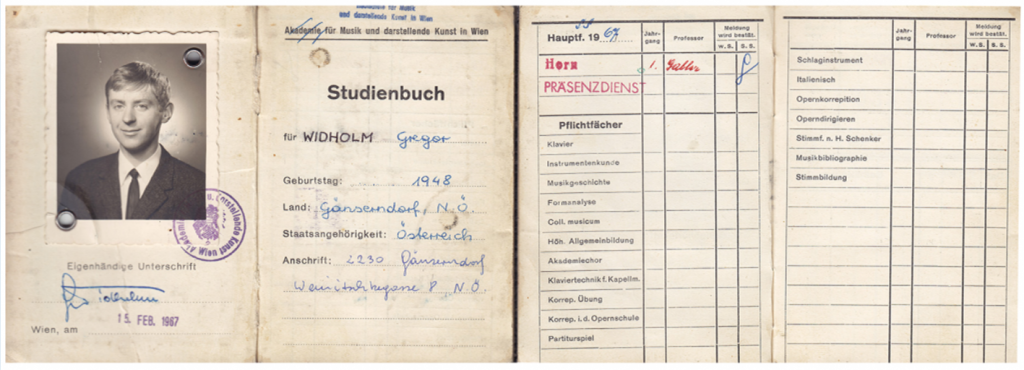
Four years later, I won the audition at the Vienna Volksoper and – although I had not yet finished my studies – I became a permanent member of the Vienna Volksoper Orchestra after completing a year of probation.– G.W.
CV | Zweiter Teil »
